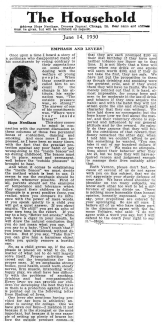Once upon a time I heard a story of a politician who disappointed many of his constituents by voting contrary to their expectations on some matter dealing with the welfare of young people. When these constituents called him to account for the change in his attitude, his explanation was, "The outside pressure was so strong!" The answer of one of his constituents was "Where were your inside braces?"
This story comes to mind in connection with the current discussion in these columns of those two perennial bones of contention, dancing and smoking. And once more I am impressed, as I have been so many times, with the fact that the greatest protection against any poor habit or any wrong-doing is the "inside braces" set up during childhood. The braces must be in place, sound and permanent, well before the "outside pressure" is brought to bear.
And when it comes to establishing the "inside braces" we must decide the method which is best to use. It seems to me the emphasis should be positive, whenever possible. First of all, parents should set the examples of temperance and tolerance which they expect their children to follow. Example is a great positive force, you realize, when you compare its influence with the power of mere words. If you speak quietly to a child you will get a quiet answer. If you shout angrily, "Be still!" you get an echo of your own tone in the retort. If you say to a boy, "Better not smoke," while you have a cigar in your mouth, he will draw the natural conclusion that you do not mean what you say. If you say to a baby, "Don't touch that!" you leave him bewildered, without direction. But if you say, "Take this!" you can give him a harmless object while you quietly remove a hurtful one.
So, as a child grows up, if the emphasis is placed on what to do, the matter of what not to do will largely solve itself. Proper activities will crowd out the temptations for improper ones. If we emphasize strong bodies, good health, sound teeth, steady nerves, firm muscle, interesting work, happy play, we shall have less difficulty with the problems of smoking, drinking and bad companionship. Every lever we can provide our children for developing the best they have in them is a protection against evil, as is pointed out in the following letter from Radical of Iowa.
One lever she mentions having provided for her boys is athletics; another is saving for college. One we have given our boys -- I mention it not because it is the strongest or the most important, but because it is one example of setting up plenty of braces before the outside pressure comes -- is that they are each promised $100 on their 21st birthday if they have used neither tobacco nor liquor up to that time. It is not likely that a time will come when one drink or one smoke will seem worth $100, and if they do not take the first, they are safe. We have not put the proposition to them as though drinking and smoking were the greatest evils, and if they avoid them they will have no faults. We have merely pointed out that it is hard, almost impossible, for young boys and men to be moderate in the use of drink and tobacco if they once acquire the habit; and with the habit they will not attain quite the size and strength and character that they can without. We have laid down no commands; but the boys know how we feel about the matter, and their voluntary choice is supported and influenced by our general attitude and by the regard. So calmly do they assume that they will fulfill the conditions of that reward, that Sonny remarked the other day, when I told him we couldn't afford to get him something he wanted, "You can take it out of my hundred dollars if you want to." We make no stipulations about their behavior after they are 21, but we hope they will have acquired reason and judgment enough to manage their lives suitably after that.
Ruth Vernon, please don't feel, because of several of us do not agree with you on this subject, that we do not appreciate your sturdy defense of your side. We have stood shoulder to shoulder on too many subjects, we know each other too well to let a difference of opinion divide us. There is nothing more honorable than honest opinion, honestly expressed. As you say, your prejudices are colored by your upbringing. So are all ours. I believer all of us who have taken part in the discussion agree with the famous Voltaire, who said: "I do not agree with a word you say, but I will defend to the death your right to say it." --Hope.

